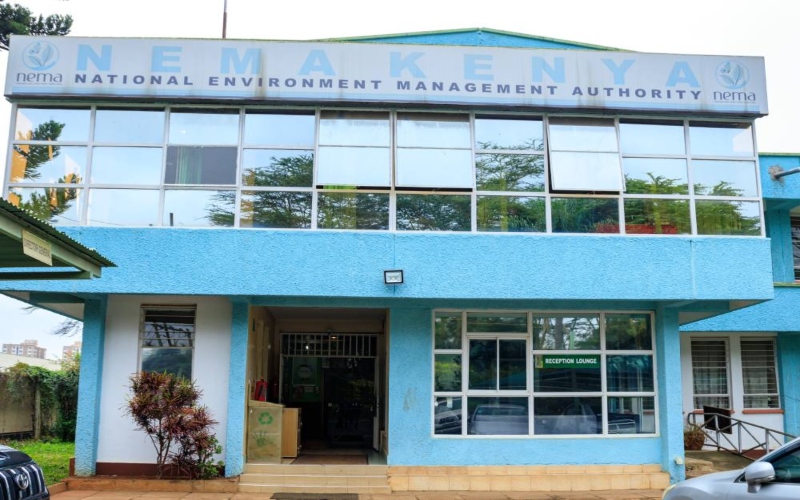NEMA under fire from Environment Institute of Kenya over unstable ENViS rollout, licensing chaos

The Environment Institute of Kenya (EIK) wants Nema to reinstate the old system while ENViS undergoes stabilisation, and to involve stakeholders in refining the platform.
The Environment Institute of Kenya (EIK) has rejected the rollout of the new Environmental Information Management System (ENViS) by the National Environment Management Authority (Nema), warning that the incomplete and untested platform is undermining environmental governance, professional integrity and national development.
EIK say thousands of experts are unable to access the platform, leaving projects, contracts and licences stalled nationwide.
More To Read
- Green economy now second-fastest global growth frontier, value hits Sh646.4 trillion - report
- Supporting Africa’s drylands: Insights from the pastoralists who call them home
- Rwanda Cabinet approves reforms on transport, currency, climate
- Truck that overturned in Uasin Gishu was ferrying natural rubber latex to DRC
- What’s at stake in the COP30 negotiations?
- Major global emitters off track, no country strong enough to meet climate targets - report
The institute has now called on Nema to revert to the old system while a structured transition is undertaken, stressing the need to address what it terms systemic legal, procurement and technical failures.
“We’re calling for Nema to revert to the old system, conduct a structured transition, and address the systemic legal, procurement, and technical failures,” the institute said in a statement.
Nema had announced in a public notice dated July 24, 2025, that ENViS, together with a new Enterprise Resource Planning (ERP) System, would digitise approvals, streamline processes and improve compliance monitoring.
“The new systems ENViS and ERP will ensure efficient service delivery and support ease of doing business in the country by enabling the public, stakeholders and proponents to access all our services online,” read the notice.
“The system will enable integration with other lead agencies for sectoral review coordination and provide real-time information sharing for informed decision making.”
However, environmental professionals argue that the rollout has stalled, making it difficult for them to deliver results.
EIK Chair Alex Mugambi said while the system was necessary and had the potential to reduce bureaucratic bottlenecks, enhance transparency, and ensure timely project execution, the rollout was rushed and poorly executed.
“We, as experts, were given only six hours’ notice before the new system was implemented, which left much to be desired on our part,” he said.
He added that environmental experts and stakeholders were not involved in the process, and no piloting or phased testing was carried out.
“The approach taken by Nema has been illegal, procedurally flawed and rushed. The resulting system is incomplete, untested and incapable of fulfilling its mandate, threatening the integrity of professional practice, delaying national development and creating unnecessary risks for proponents, investors and communities,” Mugambi said.
EIK Vice Chair Edwin Otieno described the situation as a crisis.
“As an expert, I am unable to fulfil my contractual obligations. This means I cannot submit reports, secure licenses for my clients, or obtain conclusive feedback,” he said.
He added that developers seeking funding are now stranded.
Other Topics To Read
“We’re asking Nema, what was the urgency? There was no emergency, no one was in danger, and nothing was going wrong. It could have waited until all stakeholders were fully prepared,” he said.
EIK members say the system has disrupted work for the past month, placing hundreds of contracts at risk and exposing professionals to credibility damage, with some receiving warning letters and constant calls from frustrated clients.
Chief Executive Officer Titus Mutuku said the institute had written to the Nema Director General, the Environment Cabinet Secretary and the Principal Secretary but received no reply.
“Unfortunately, our letters were never acknowledged, and to date, we have not received any response,” he said.
Mutuku added that the problem goes beyond environmental licensing.
“It affects every sector reliant on a functional regulatory system, including agriculture, construction, energy, mining, tourism, manufacturing, research, finance, public health, and civil society,” he said.
He called for solidarity from environmental professionals, project proponents, civil society actors, investors and citizens.
“Together, we must demand legality, transparency, accountability, and functional systems that protect our environment, safeguard professional integrity, and support national development,” he said.
At least 6,000 to 10,000 experts are reportedly unable to access the system. Subsectors such as Environmental Impact Assessment (EIA) licenses, environmental audits, noise permits, air quality licenses, accreditation and waste management permits have also reportedly been put on hold, since without proper licensing, nothing can legally proceed.
Experts also noted that in rare cases when the platform generates licences, they are incomplete, sometimes missing essential details such as the name of the proponent or developer, making them non-compliant.
The professionals now want Nema to reinstate the old system while ENViS undergoes stabilisation, and to involve stakeholders in refining the platform.
“This ensures that all user needs are addressed, fosters transparency, and aligns system functionality with legal and operational requirements,” they said.
Top Stories Today














































